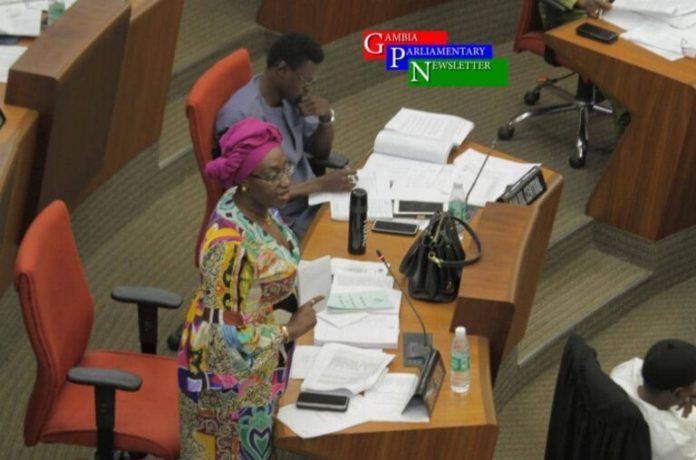BY YUSEF TAYLOR ON DECEMBER 21, 2022BUSINESS ECONOMY, HUMAN RIGHTS, NATIONAL ASSEMBLY, NEWS, TRRC
By Yusef Taylor, @FlexDan_YT
Gambian National Assembly members have questioned Finance Minister Hon Seedy Keita on the provision of reparations for victims of the Truth Reconciliation and Reparations Commission (TRRC) and funds to implement the recommendations of the Commission in the 2023 Budget. The TRRC is a Commission enacted by the Fifth Legislature in 2017 to investigate the Human Rights Violations of the former Regime of President Yahya Jammeh. The current administration of President Adama Barrow accepted most of the recommendations of the TRRC in its White Paper issued on 25th May 2022.
To implement the recommendations, member for Banjul South, Hon Fatoumatta Njai instructed Finance Minister Hon Keita to allocate funds towards the implementation of the TRRC’s Recommendations during the debate on the 2023 Executive Budget Estimates which took place on Thursday 24th November 2022. The following day Hon Sulayman Saho of Central Badibu questioned the Government’s readiness to pay reparations to the Victims.
Gainako has been following the Government’s pledges to pay reparations to victims and the sum of reparations paid to TRRC Victims. The Government first paid D50 million into the Victims Reparations Fund back in 2019 during the tenure of former Justice Minister Hon Baa Tambedu and has not paid another butut towards Reparations. The TRRC used this D50 million to pay for Interim reparations to the tune of D13 million and used the remaining D36 million to pay victims the first round of reparations payments.
Speaking on the implementation of the TRRC’s Recommendations, Hon Fatoumatta Njai noted that she had “looked at the Ministry of Justice’s Budget,” however, she noticed that D46 million was allocated to the TRRC in 2021 and zero was allocated for 2022 and 2023.
This compelled her to question “is the President not willing to act on the recommendations of the TRRC?” In her view, “we’ve suffered for over 22 years and after 22 years, 2016 we thought we were embarking on change and the Hon President imposed certain people on us and I think that was deliberate so that we will not implement the recommendations of the TRRC”.
She instructed the Minister of Finance Hon Keita to take action and allocate funds towards the implementation of the TRRC Recommendations. “Mr Minister, take note of that please. We did not suffer for 22 years in vain. I personally lost my dad under a dictatorship of the previous regime. Am not saying do whatever but am saying let’s work on the recommendations. Let us act on them, put money on it so that we will at least have hope that there will be recommendations,” said the Hon member for Banjul South.

D75 Million Has Been Allocated to TRRC Victims
The following day Friday 25th November 2022 during the continuation of the debate on the 2023 Draft Budget and Estimates Hon Sulayman Saho of Central Badibu raised a poignant question on Victim’s Reparations. Hon Saho asked, “as far as reparations is concerned” is the Government “fully ready to make sure people are reparated? Like the victims because they have been crying for so long.”
In response, Finance Minister Hon Seedy Keita revealed that D75 million has been allocated to the Ministry of Justice for Reparations in 2023. Hon Keita explained that “our job is to make funds available. The legal or the other logistics is housed in the Ministry of Justice but we provided D75 million for that”.
It can be recalled that the Ministry of Justice promised to pay Victim’s Reparations in the sum of D150 million back in October 2021 when the Victims embarked on the Never Again March. However, the Government did not pay the victims any reparations claiming that they need a Bill passed at the National Assembly to commence the payment of reparations.
It can be seen that the 2022 Approved Budget did allocate D163 million to victims for reparations however, this was also revised downwards to D100 million back in late July 2022 after Parliamentarians approved the 2022 Revised Budget. However, if the Ministry sticks by its plan to pay reparations after the passing of the Victims Bill, then payments will most likely not take effect this year.
Our reporter held an exclusive interview with Counsel Kimbeng Tah back in October 2022 about the Bill and he was ambitious that the Bill will be tabled in December 2022. Mr Tah who is the Head of International Arbitration explained that the MoJ’s “target is to have this Bill passed at the December session…we [MoJ] sent it [draft bill] to parliament and we have told parliament this is one of our priorities.”
“So, in December if it passes, we can be sure that by January the [interim] body will [be] set up and we start payment,” however, “we cannot control parliament but we are still consulting on it because we finish drafting [the Victims Bill],” said Lawyer Tah.
However, a look at Parliament’s Agenda for the Fourth Ordinary Session which runs all the way towards the end of December 2022 reveals that Victims Bill is not on the agenda. This means that except a certificate of urgency is issued the Bill will most likely not be tabled in Parliament this year.
This publication was supported by the International Center for Transitional Justice (ICTJ).



